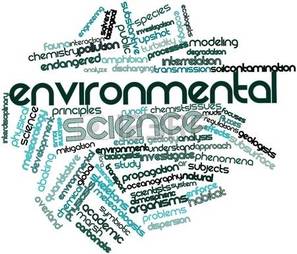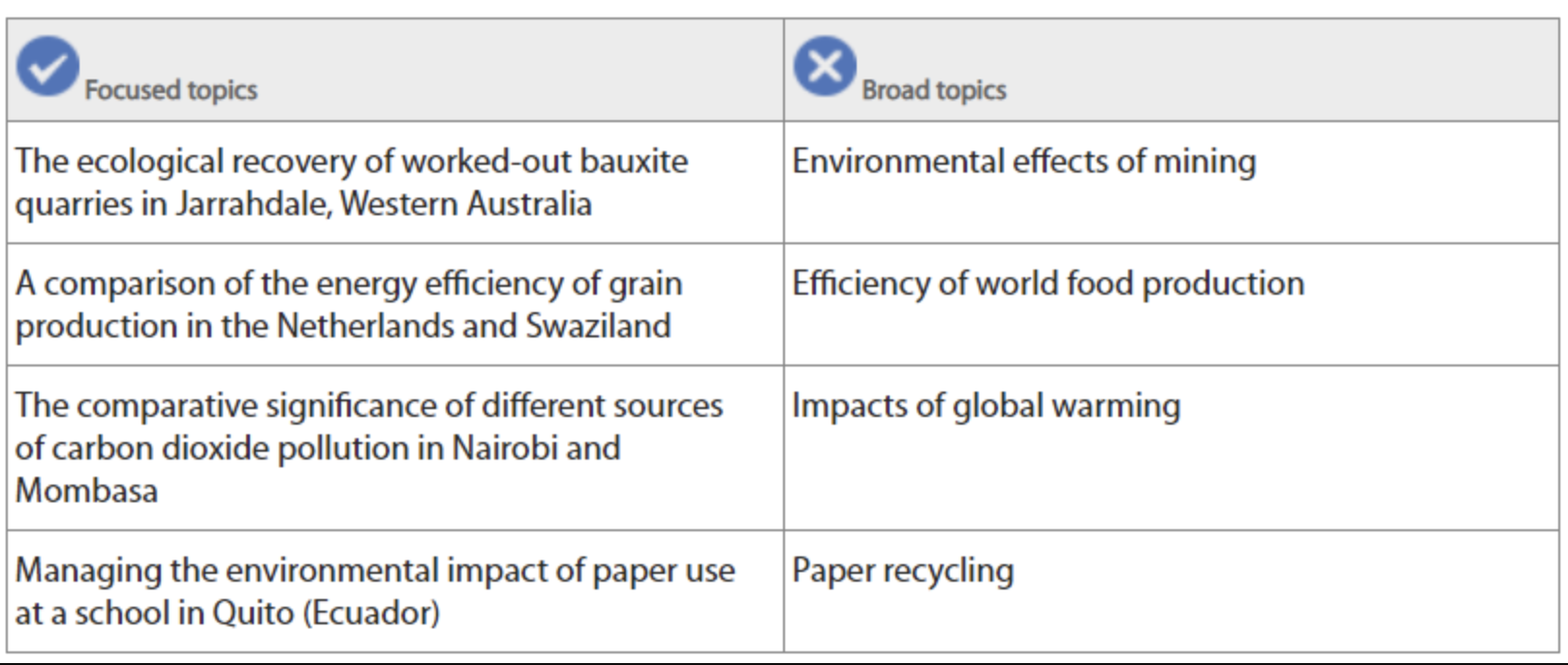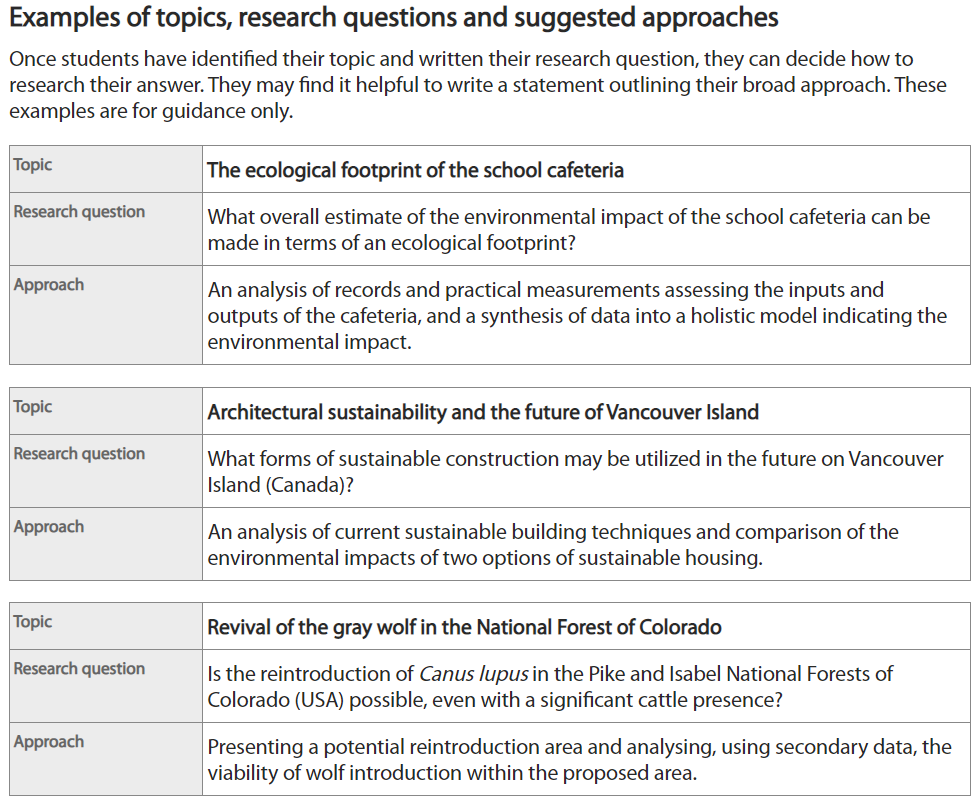extended essay in environmental systems and societies
The extended essay (EE) is an integral part of the IB Diploma course. In order to write a good EE in ESS you need to first of all be interested in and passionate about the environment; and secondly be prepared to put in the hard work.
You will research and write about an environmental topic or issue of relevance to you and your environment. Your
writing should cover the environmental system and how society functions – you must conduct an analytical
argument.
It is important that you read through this guide before you even think about doing EE in ESS. You can also go to the IB and read through the subject specific guide or to the DP Extended Essay Home page
You will research and write about an environmental topic or issue of relevance to you and your environment. Your
writing should cover the environmental system and how society functions – you must conduct an analytical
argument.
It is important that you read through this guide before you even think about doing EE in ESS. You can also go to the IB and read through the subject specific guide or to the DP Extended Essay Home page
Extended Essay Information Guide (from the IBO)
Overview
Environmental issues are occupying a position of increasing significance on the world agenda, and an extended essay in environmental systems and societies provides students with an opportunity to explore an environmental topic or issue of particular interest or relevance to themselves and their localities.
You will be expected to:
An extended essay in Environmental Systems and Societies provides you with the opportunity to explore questions in terrestrial, freshwater or marine environments. The characteristic nature of an essay in this subject will lie in the application of a systems approach to an environmental issue.
Environmental issues are occupying a position of increasing significance on the world agenda, and an extended essay in environmental systems and societies provides students with an opportunity to explore an environmental topic or issue of particular interest or relevance to themselves and their localities.
You will be expected to:
- integrate theoretical contexts and methodologies with academic disciplines appropriate to the chosen topic
- use a systems approach in the analysis and interpretation of their data.
An extended essay in Environmental Systems and Societies provides you with the opportunity to explore questions in terrestrial, freshwater or marine environments. The characteristic nature of an essay in this subject will lie in the application of a systems approach to an environmental issue.
Choice of topic
Environmental systems and societies focuses upon the interaction and integration of “natural” environmental systems and human societies. Your topic should:
Before a final decision is made about the choice of topic the relevant subject guidelines should be carefully considered.
You should aim to choose a topic that is both interesting and challenging.. The topic chosen should be limited in scope and sufficiently narrow to allow you to examine an issue or problem in depth. It should present you with the opportunity to collect or generate information and/or data for analysis and evaluation. You are not expected to make a contribution to knowledge within a subject.
A crucial feature of any suitable topic is that it must be open to analytical argument. If the topic chosen fails in this regard, and lends itself only to a descriptive or narrative treatment, then you will be denied a large proportion of the available credit according to the assessment criteria. For example, it would be of minimal value simply to describe a given nature reserve; it would be necessary to evaluate its relationship with a local community possibly, or compare its achievement with original objectives or with a similar initiative elsewhere. The topic must, in some way, leave room for an argument that you construct and support from your own analysis of the information, rather than simply reporting analyzed data obtained from other sources.
Some topics are unsuitable for ethical or safety reasons, such as those requiring experiments that might:
These guidelines should be read in conjunction with the IB extended essay general guidelines.
Environmental systems and societies focuses upon the interaction and integration of “natural” environmental systems and human societies. Your topic should:
- have a sharp focus on the interaction between environmental systems and societies,
- should give significant (though not necessarily equal) weight to both the ecological processes and societal activities
- be interdisciplinary in nature,
- be open to analytical argument,
- allow you to demonstrate some grasp of how both environmental systems and societies function in the relationship. Your study must explore the context of some human interaction with the environmental system.
Before a final decision is made about the choice of topic the relevant subject guidelines should be carefully considered.
You should aim to choose a topic that is both interesting and challenging.. The topic chosen should be limited in scope and sufficiently narrow to allow you to examine an issue or problem in depth. It should present you with the opportunity to collect or generate information and/or data for analysis and evaluation. You are not expected to make a contribution to knowledge within a subject.
A crucial feature of any suitable topic is that it must be open to analytical argument. If the topic chosen fails in this regard, and lends itself only to a descriptive or narrative treatment, then you will be denied a large proportion of the available credit according to the assessment criteria. For example, it would be of minimal value simply to describe a given nature reserve; it would be necessary to evaluate its relationship with a local community possibly, or compare its achievement with original objectives or with a similar initiative elsewhere. The topic must, in some way, leave room for an argument that you construct and support from your own analysis of the information, rather than simply reporting analyzed data obtained from other sources.
Some topics are unsuitable for ethical or safety reasons, such as those requiring experiments that might:
- inflict pain on living organisms
- cause unwarranted environmental damage
- put pressure on others to behave unethically
These guidelines should be read in conjunction with the IB extended essay general guidelines.
A further critical feature of a successful topic is the sharpness of its focus. If a topic is too broad, it will inevitably lead to a relatively superficial treatment that, again, is likely to penalize the student right from the start. In topics that are too broad, it is unlikely that students will be able to produce any significantly fresh analysis, arguments or meaningful conclusions of their own. To clarify the distinction between a broad and a sharply focused topic, the following examples of titles for environmental systems and societies extended essays are intended as guidance only. The pairings illustrate that focused topics (indicated by the first title) should be encouraged rather than the broad topics (indicated by the second title).
Some examples of this might be the following.
Topic Impact of exotic plants on herbivore diversity in Tanzania
To what extent does the length of time after an exotic plant has been introduced to an area, and the latitude from which it originates, affect the diversity of herbivores found feeding on it?
Research question
A fieldwork investigation into the diversity of epiphytic herbivores on a range of exotic plants in the Kilimanjaro region, linked to a brief historical study of each plant’s introduction.
Topic Evaluating the philosophical aims and achievement in local conservation
To what extent are the philosophical principles and objectives of a local conservation group being fulfilled in protecting the local environment?
Research question
An analysis of literature and attitudes from a conservation group, along with a quantitative analysis of records of environmental quality.
Topic The ecological footprint of the school canteen
From the major inputs and outputs of the school canteen, what overall estimate of its environmental impact can be made in terms of an ecological footprint?
Research question
An analysis of records and practical measurements assessing the inputs and outputs of the canteen, and a synthesis of data into a holistic model indicating the environmental impact.
For some investigations, particularly those that are experimental, a clearly stated hypothesis may be just as acceptable as, and possibly better than, a research question.
Since the IB course in environmental systems requires expertise in both earth and life sciences, it is to some degree interdisciplinary. Great care should be taken to ensure that the topic undertaken for an extended essay would not be more appropriate to biology or geography, but represents a truly integrated systems approach to the environment.
Although similar assessment criteria apply to all extended essays in the experimental sciences, for an extended essay submitted in environmental systems the topic chosen must allow for a systems approach. That is to say, the topic should allow for the collection of objective, usually quantitative, data that can be used for the construction of appropriate models, such as graphical representations and flow diagrams.
Topic Impact of exotic plants on herbivore diversity in Tanzania
To what extent does the length of time after an exotic plant has been introduced to an area, and the latitude from which it originates, affect the diversity of herbivores found feeding on it?
Research question
A fieldwork investigation into the diversity of epiphytic herbivores on a range of exotic plants in the Kilimanjaro region, linked to a brief historical study of each plant’s introduction.
Topic Evaluating the philosophical aims and achievement in local conservation
To what extent are the philosophical principles and objectives of a local conservation group being fulfilled in protecting the local environment?
Research question
An analysis of literature and attitudes from a conservation group, along with a quantitative analysis of records of environmental quality.
Topic The ecological footprint of the school canteen
From the major inputs and outputs of the school canteen, what overall estimate of its environmental impact can be made in terms of an ecological footprint?
Research question
An analysis of records and practical measurements assessing the inputs and outputs of the canteen, and a synthesis of data into a holistic model indicating the environmental impact.
For some investigations, particularly those that are experimental, a clearly stated hypothesis may be just as acceptable as, and possibly better than, a research question.
Since the IB course in environmental systems requires expertise in both earth and life sciences, it is to some degree interdisciplinary. Great care should be taken to ensure that the topic undertaken for an extended essay would not be more appropriate to biology or geography, but represents a truly integrated systems approach to the environment.
Although similar assessment criteria apply to all extended essays in the experimental sciences, for an extended essay submitted in environmental systems the topic chosen must allow for a systems approach. That is to say, the topic should allow for the collection of objective, usually quantitative, data that can be used for the construction of appropriate models, such as graphical representations and flow diagrams.
How do I come up with a good research question?
During the first meeting with your adviser, discuss the research you've done, your ideas, and the requirements for your subject. Decide on the most suitable research question
For some investigations, particularly those that are experimental, a clearly stated hypothesis may be just as acceptable as, and possibly better than, a research question.
- It isn't easy, but it is important!
- Decide on a subject in which to write the essay
- Check the list of available subjects here
- Read the IB's criteria for your subject
- Read an exemplar essay in your subject
- Decide on a topic within this subject
- Explore some possible research questions relating to this topic
- This means you will need to do some research!
- Discuss these with your adviser
During the first meeting with your adviser, discuss the research you've done, your ideas, and the requirements for your subject. Decide on the most suitable research question
For some investigations, particularly those that are experimental, a clearly stated hypothesis may be just as acceptable as, and possibly better than, a research question.
Treatment of the topic
An extended essay in Environmental Systems and Societies may be investigated either through primary data collection (from fieldwork, laboratory experimentation, surveys or interviews) or, alternatively, through secondary data collection (from literature or other media).
It may involve a combination of the two, although, given the limited time available and word limit for the essay, the emphasis should be clearly with one or the other to avoid the danger of both becoming rather superficial. If the essay is focused largely on the collection of primary data, you need to exercise great care in selecting appropriate methods of data collection and carrying them out effectively.
Before commencing the investigation, explore literature relating to your methodology, and also any pertinent research that may give you guidelines and useful points of theoretical comparison. Hence, even in an investigation based exclusively on primary data, the bibliography should indicate at least some recognition of secondary sources, perhaps supporting the choice and implementation of methods or providing an academic context for the conclusions.
If the essay is focused on secondary data, you need to take great care in selecting sources, ensuring that there is a sufficient quantity and range, and that they are all reliable. There is a great mass of populist, journalistic, partisan and unfounded claims available through the Internet and other media.
You MUST take on the task of sorting through these and using only those sources that have some academic credibility. An essay of this type would normally be expected to produce a substantial bibliography and not be limited to just a few sources.
It is vital that you are involved in producing your own analysis of the data and arguing your own conclusions. This will happen more naturally if the essay is based on primary data since the data will not have been previously analyzed. A source of secondary data, however, may come with its own analysis and conclusions. In this case, it is essential that you further manipulate this data, or possibly synthesize it with other sources, so that there is clear evidence in the essay of your personal involvement in analysis and drawing of conclusions. Whether using primary or secondary data, you should construct your own critical arguments by using and evaluating the sources available.
Finally, a central theme in the Environmental Systems and Societies syllabus is the use of the systems approach, and this should be reflected to some degree in the extended essay. The essay should include an attempt to model, at least partially, the system or systems in question. The term “model” in this context is intended in its broadest sense to include:
Students should use ESS terminology, where appropriate.
An extended essay in Environmental Systems and Societies may be investigated either through primary data collection (from fieldwork, laboratory experimentation, surveys or interviews) or, alternatively, through secondary data collection (from literature or other media).
It may involve a combination of the two, although, given the limited time available and word limit for the essay, the emphasis should be clearly with one or the other to avoid the danger of both becoming rather superficial. If the essay is focused largely on the collection of primary data, you need to exercise great care in selecting appropriate methods of data collection and carrying them out effectively.
Before commencing the investigation, explore literature relating to your methodology, and also any pertinent research that may give you guidelines and useful points of theoretical comparison. Hence, even in an investigation based exclusively on primary data, the bibliography should indicate at least some recognition of secondary sources, perhaps supporting the choice and implementation of methods or providing an academic context for the conclusions.
If the essay is focused on secondary data, you need to take great care in selecting sources, ensuring that there is a sufficient quantity and range, and that they are all reliable. There is a great mass of populist, journalistic, partisan and unfounded claims available through the Internet and other media.
You MUST take on the task of sorting through these and using only those sources that have some academic credibility. An essay of this type would normally be expected to produce a substantial bibliography and not be limited to just a few sources.
It is vital that you are involved in producing your own analysis of the data and arguing your own conclusions. This will happen more naturally if the essay is based on primary data since the data will not have been previously analyzed. A source of secondary data, however, may come with its own analysis and conclusions. In this case, it is essential that you further manipulate this data, or possibly synthesize it with other sources, so that there is clear evidence in the essay of your personal involvement in analysis and drawing of conclusions. Whether using primary or secondary data, you should construct your own critical arguments by using and evaluating the sources available.
Finally, a central theme in the Environmental Systems and Societies syllabus is the use of the systems approach, and this should be reflected to some degree in the extended essay. The essay should include an attempt to model, at least partially, the system or systems in question. The term “model” in this context is intended in its broadest sense to include:
- mathematical formulae,
- maps,
- graphical representations,
- flow diagrams.
Students should use ESS terminology, where appropriate.
Interpreting the assessment criteria
Criterion A: Focus and method
This criterion focuses on the topic, the research question and the methodology. It assesses the explanation of the focus of the research (this includes the topic and the research question), how the research will be undertaken, and how the focus is maintained throughout the essay.
To meet this criterion, a sharply focused research question defining the purpose of the essay must be stated clearly within the introduction. It is not sufficient simply to include it on the title page. To make “effective treatment possible”, first, it must not be too broad, which will lead to superficial treatment. Second, it must allow for critical argument, and not simply require a descriptive or narrative treatment. For example, “To what extent is X like Y?” allows for argument, whereas “What is X like?” only invites simple description.
The introduction should set the research question or hypothesis in context. For example, it might outline necessary theoretical principles on which the topic depends, summarize other related research conclusions, or give a brief history or geographical location of the issue under discussion. The introduction should also indicate the significance of the question being researched—Why is it important to answer it? What value might it have to others? What implications could the findings have?
It is also important that the introduction does not become too long. Material should only be included where it is directly required in order to follow the overall argument of the essay
In this subject, it can be quite acceptable to formulate the research question as a clearly stated hypothesis.
This may be particularly appropriate, for example, in experimental investigations. A hypothesis, as the starting point of an experimental investigation, will always lead to the implicit critical argument concerning the extent to which the results support or refute it.
This criterion focuses on the topic, the research question and the methodology. It assesses the explanation of the focus of the research (this includes the topic and the research question), how the research will be undertaken, and how the focus is maintained throughout the essay.
To meet this criterion, a sharply focused research question defining the purpose of the essay must be stated clearly within the introduction. It is not sufficient simply to include it on the title page. To make “effective treatment possible”, first, it must not be too broad, which will lead to superficial treatment. Second, it must allow for critical argument, and not simply require a descriptive or narrative treatment. For example, “To what extent is X like Y?” allows for argument, whereas “What is X like?” only invites simple description.
The introduction should set the research question or hypothesis in context. For example, it might outline necessary theoretical principles on which the topic depends, summarize other related research conclusions, or give a brief history or geographical location of the issue under discussion. The introduction should also indicate the significance of the question being researched—Why is it important to answer it? What value might it have to others? What implications could the findings have?
It is also important that the introduction does not become too long. Material should only be included where it is directly required in order to follow the overall argument of the essay
In this subject, it can be quite acceptable to formulate the research question as a clearly stated hypothesis.
This may be particularly appropriate, for example, in experimental investigations. A hypothesis, as the starting point of an experimental investigation, will always lead to the implicit critical argument concerning the extent to which the results support or refute it.
|
Level 5-6
|
The topic is communicated accurately and effectively.
The research question is clearly stated and focused.
Methodology of the research is complete.
There is evidence of effective and informed selection of sources and/or methods. If the topic or research question is deemed inappropriate for the subject in which the essay is registered no more than four marks can be awarded for this criterion. |
Criterion B: Knowledge and Understanding
This criterion assesses the extent to which the research relates to your subject area/discipline used to explore the research question, or in the case of the world studies extended essay, the issue addressed and the two disciplinary perspectives applied, and additionally the way in which this knowledge and understanding is demonstrated through the use of appropriate terminology and concepts.
You are expected to have a sound knowledge and understanding of environmental systems and societies:
Where the study involves experimentation or practical fieldwork,
If the study is based on the research of secondary data
This criterion assesses the extent to which the research relates to your subject area/discipline used to explore the research question, or in the case of the world studies extended essay, the issue addressed and the two disciplinary perspectives applied, and additionally the way in which this knowledge and understanding is demonstrated through the use of appropriate terminology and concepts.
You are expected to have a sound knowledge and understanding of environmental systems and societies:
- current environmental systems and societies terminology.
- for many topics, this knowledge may need to be supplemented through independent study
- possess sufficient knowledge of the topic to handle the issues and arguments effectively
- show clear and perceptive links between your own study and the body of theoretical knowledge associated with your subject
Where the study involves experimentation or practical fieldwork,
- a detailed description of the procedures must be used, possibly with diagrams or photographs,
- repeatable study.
- design of experiments must be quantifiable, have controls, have replication and include random sampling, where appropriate.
- techniques should be explained and justified, and any assumptions upon which they depend should be clearly stated.
If the study is based on the research of secondary data
- ensure that the selection of sources is sufficiently wide and reliable
- where Internet-based sources are used be particularly aware of the potential of unreliability.
- process of selecting sources and data should be described and justified, and, in cases where there is a variety of relevant perspectives held, the selection of sources should reflect this.
- where appropriate, there should be an indication of the methods by which the secondary data has been generated or the evidence upon which it is founded.
|
Level 5-6
|
Knowledge and understanding is excellent.
The use of subject-specific terminology and concepts is accurate and consistent, demonstrating effective knowledge and understanding. If the topic or research question is deemed inappropriate for the subject in which the essay is registered no more than four marks can be awarded for this criterion. |
Criterion C: Critical thinking
This criterion assesses the extent to which critical-thinking skills have been used to analyze and evaluate the research undertaken.
There should be:
Analytical skills can be demonstrated:
Evaluative skills will be apparent in
It is highly recommended that this aspect of the essay is
This criterion assesses the extent to which critical-thinking skills have been used to analyze and evaluate the research undertaken.
There should be:
- clear step-by-step logical argument linking the raw data to the final conclusions.
- able to defended against any plausible alternatives and potential criticisms with clear evidence. Personal opinions are acceptable, but again should be convincingly substantiated by the available evidence.
- an argument that directly answers the research question in the precise way that it has been formulated.
Analytical skills can be demonstrated:
- in the selection, manipulation and presentation of quantitative or qualitative data gathered from either primary or secondary sources.
- in graphical representations, mathematical manipulations or flow diagrams.
- in the selection of specific data from sources, identifying the relevance and relationships to one another, and reorganizing them into an effective verbal argument.
Evaluative skills will be apparent in
- the reliability and validity of the data gathered and subsequent interpretations.
- collecting primary data, this will involve discussing inadequacies in the experimental design, the validity of assumptions made, limitations of the investigation, and any systematic errors and how they might have been avoided.
- collecting secondary data, similar considerations should be applied to the sources that were accessed.
It is highly recommended that this aspect of the essay is
- given a separate section with its own heading.
- a brief, concise statement of the conclusion that is in direct response to the research question or hypothesis.
- should not involve new information or arguments, but should be a summary of what can be concluded from, and is supported by, the evidence and argument already presented.
- a concluding statement, should identify outstanding gaps in your research or new questions that have emerged and deserve further attention
|
Level 10–12
|
The research is excellent.
|
Criterion D: Presentation
This criterion assesses the extent to which the presentation follows the standard format expected for academic writing and the extent to which this aids effective communication.
You are expected to use appropriate scientific and systems terminology, as employed in the current
Environmental Systems and Societies guide.
This criterion relates to the extent to which the essay conforms to academic standards about the way in which research papers should be presented.
Particular attention should be paid to the use of graphs, diagrams, illustrations and tables of data.
This criterion assesses the extent to which the presentation follows the standard format expected for academic writing and the extent to which this aids effective communication.
You are expected to use appropriate scientific and systems terminology, as employed in the current
Environmental Systems and Societies guide.
This criterion relates to the extent to which the essay conforms to academic standards about the way in which research papers should be presented.
- The presentation of essays that omit a bibliography or that do not give references for quotations is deemed unacceptable (level 0).
- Essays that omit one of the required elements—title page, table of contents, page numbers—are deemed no better than satisfactory (maximum level 2),
- Essays that omit two of the elements are deemed poor at best (maximum level 1).
Particular attention should be paid to the use of graphs, diagrams, illustrations and tables of data.
- appropriately labelled with a figure or table number,
- an appropriate title,
- citations where appropriate, and be located in the body of the essay, as close as possible to their first reference.
- any downloaded or photocopied material included should be clearly legible.
|
Level 3-4
|
Presentation is good.
|
Criterion E: Engagement
This criterion assesses your engagement with your research focus and the research process. It will be applied by the examiner at the end of the assessment of the essay, and is based solely on your reflections as detailed on the RPPF, with the supervisory comments and extended essay itself as context.
This criterion assesses your engagement with your research focus and the research process. It will be applied by the examiner at the end of the assessment of the essay, and is based solely on your reflections as detailed on the RPPF, with the supervisory comments and extended essay itself as context.
|
Level 5-6
|
Engagement is excellent.
|
Self assessment
The table below is designed to help you think about the assessment criteria and whether you have addressed the expectations within your essay. You do not need to address all of the questions posed, but they do provide some guidance in terms of what to consider. (From IBO)
|
Criterion
A: Focus and method
|
Unpacking the criteria
This criterion focuses on the topic, the research question and the methodology. It assesses the explanation of the focus of the research (this includes the topic and the research question), how the research will be undertaken, and how the focus is maintained throughout the essay.
|
|
B: Knowledge and understanding
|
This criterion assesses the extent to which the research relates to the subject area/discipline used to explore the research question; or in the case of the world studies extended essay, the issue addressed and the two disciplinary perspectives applied; and additionally, the way in which this knowledge and understanding is demonstrated through the use of appropriate terminology and concepts.
|
|
C: Critical thinking
|
This criterion assesses the extent to which critical thinking skills have been used to analyse and evaluate the research undertaken.
|
|
D: Presentation
|
This criterion assesses the extent to which the presentation follows the standard format expected for academic writing and the extent to which this aids effective communication.
|
|
E. Engagement
|
This criterion assesses the student’s engagement with their research focus and the research process. It will be applied by the examiner at the end of the assessment of the essay, after considering the students RPPF.
|
Grade descriptors
The extended essay is externally assessed, and as such, supervisors are not expected to mark the essays or arrive at a number to translate into a grade. Predicted grades for all subjects should be based on the qualitative grade descriptors for the subject in question. These descriptors are what will be used by senior examiners to set the boundaries for the extended essay in May 2018, and so schools are advised to use them in the same way.
The extended essay is externally assessed, and as such, supervisors are not expected to mark the essays or arrive at a number to translate into a grade. Predicted grades for all subjects should be based on the qualitative grade descriptors for the subject in question. These descriptors are what will be used by senior examiners to set the boundaries for the extended essay in May 2018, and so schools are advised to use them in the same way.
Environmental Systems and Societies Extended Essay Resources
Good Research Questions pdf
Extended Essay Skeleton Outline Template
Extended Essay Criterion and notes for ESS
Extended Essay Student Example - Economics of Wolves (Example Mark Scheme)
Extended Essay Skeleton Outline Template
Extended Essay Criterion and notes for ESS
Extended Essay Student Example - Economics of Wolves (Example Mark Scheme)
Examples:
The Economic Impact on the 1995 Reintroduction of Grey Wolves into Yellowstone National Park
Assessed Marks
Developing a model to evaluate the sustainability of marine turtle conservation organizations
Assessed Marks
The Economic Impact on the 1995 Reintroduction of Grey Wolves into Yellowstone National Park
Assessed Marks
Developing a model to evaluate the sustainability of marine turtle conservation organizations
Assessed Marks
The following provide good links for Extended Essay Examples
ibGuides
ibGuides
- How does systems or models work on an ecological framework?
- Change is aquatic ecosystem after human influence.
- How do a particular species affect the food chain in an area?
- Forest and woodland restoration in any region in (a specific country).
- Extrinsic and Intrinsic Factors Affecting the Resilience of Corals in (a specific area).
- Effect of Climate Change on Population Trajectories and Tropic Interactions in a High Elevation Riparian Ecosystem in (a specific country).
- The Science for the Conservation of Coral Reefs in (a specific area).
- Potential population growth and future changes in population of region.
- How does carrying capacity of a named area will affect the population of that area?
- Depletion of certain resources in an area effect the socio-ecological pattern of that area.
- How certain mine effect the ecological and socio-economic of an area.
- Assess the potential of geothermal energy in (a specific country).
- Study and Suggestions for increased ecological footprint of an area in (a specific country).
- Impact of mangrove biodiversity in Indonesia through human influence.
- Changing aspects of equatorial rain forest and its effects on ecological set-up of the area.
- Coastal Ecosystem its processes and anthropogenic impact in (a specific country).
- Analysis of mangrove ecosystems in its impact of coastal area.
- Physiology of tree I coastal area and its impact on environment.
- How pollution management strategies in a specific area help to protect environmental concern in the area?
- How unplanned development of human interferences can cause for ecological imbalances in an area.
- Comparison of various water bodies in an urban area affect through human response.
- How eco-friendly a housing society is? What role it has to conserve the environment.
- Impact of an industry in water bodies or atmospheric condition of the area.
- Pollution check and management strategies for canal route of (a specific countryP
- Assessing impact of global warming in an area/species of plant and animal.
- Recording and evaluating of various climatic data related to global warming and its impact in the current environmental conditions.
- Interactions of Climate Change and Other Environmental Factors on Invasive Plant Infestation in (a specific area)
- Human reaction and Socio-ecological impact of dam in any part of of a specific country
|
|
|
|
|
|















